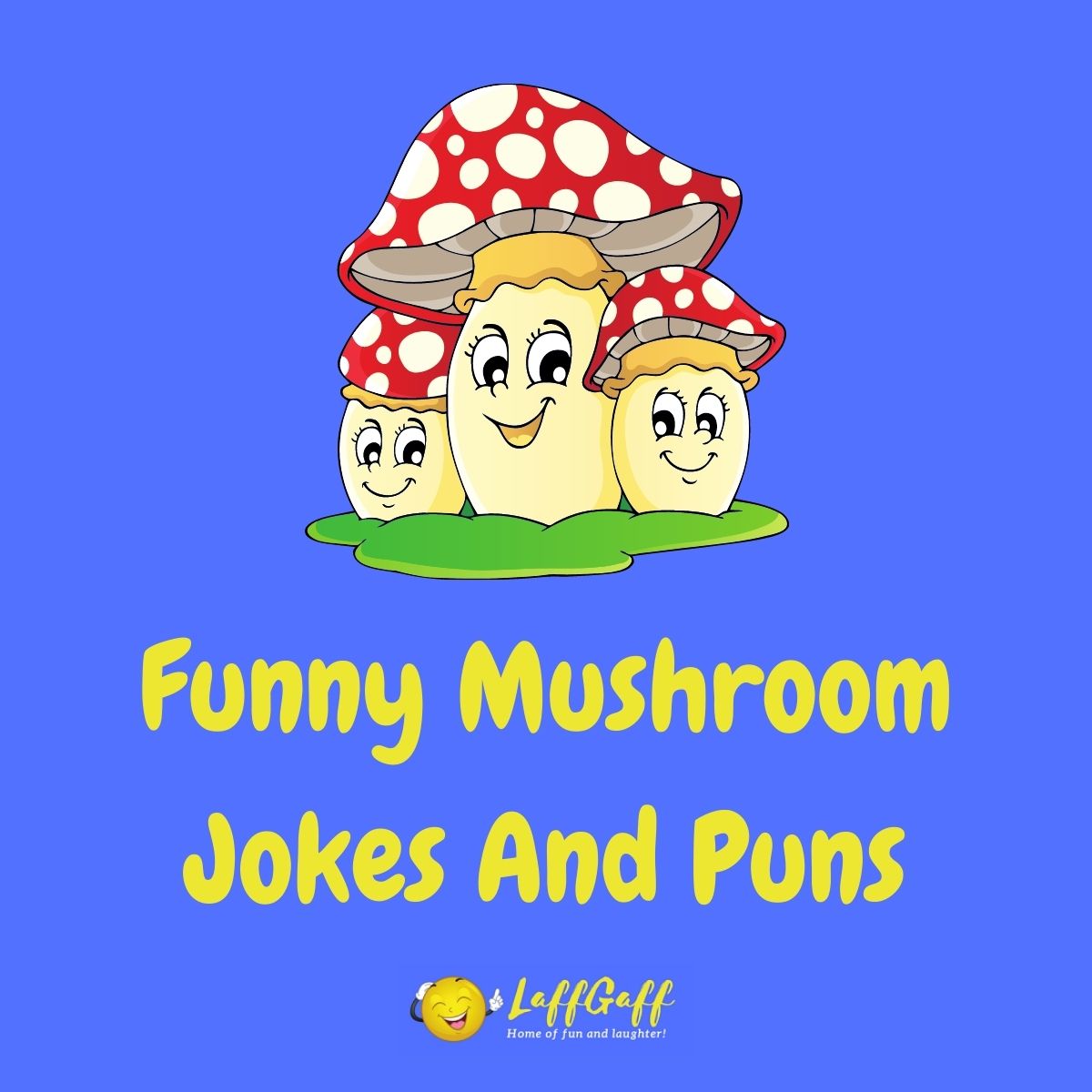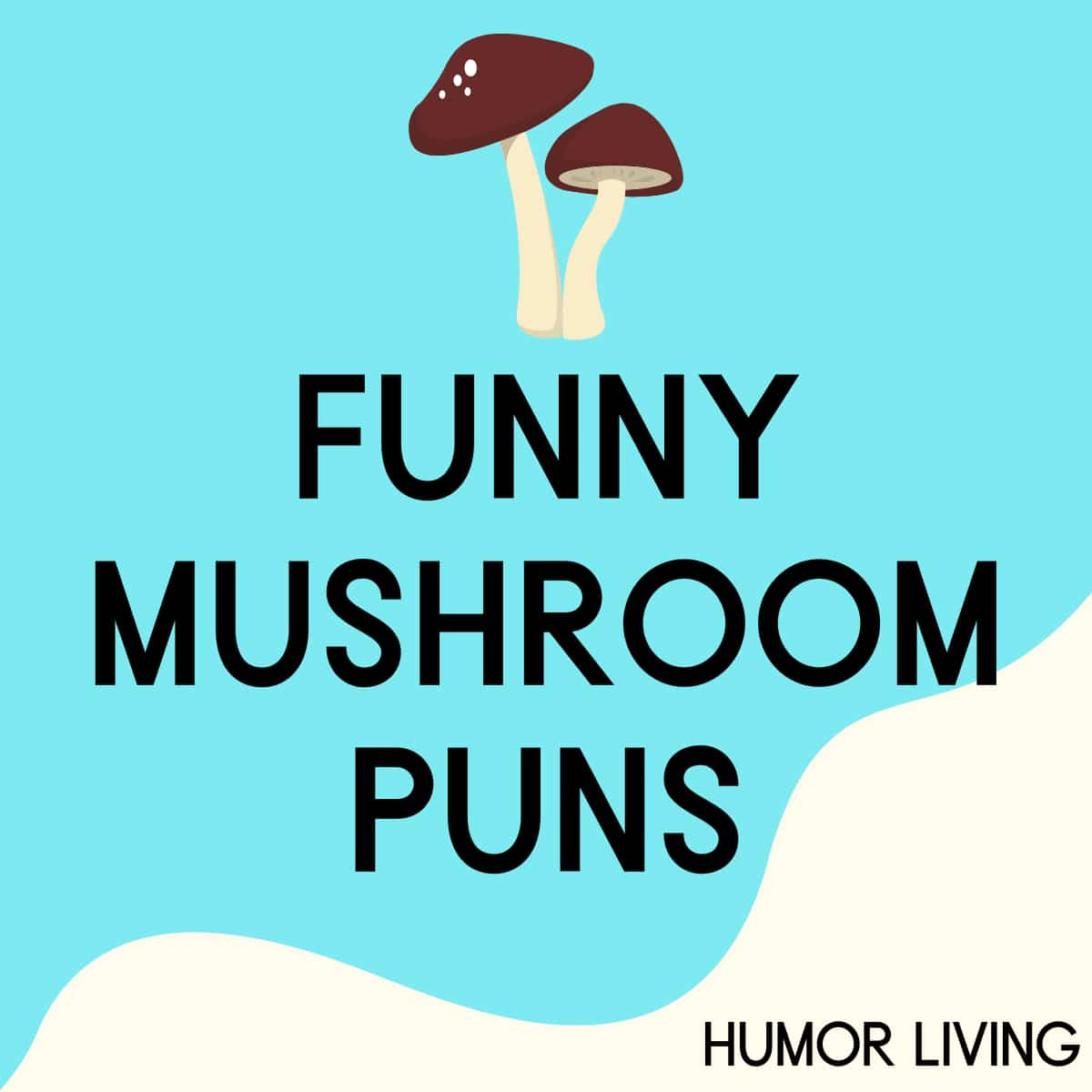Hilarious Mushroom Jokes: The Ultimate Collection
What are mushroom jokes? Mushroom jokes are a type of joke that plays on the unique characteristics of mushrooms, such as their appearance, growth habits, and culinary uses. These jokes can be puns, riddles, or simple observations that highlight the absurdity or humor inherent in mushrooms.
Definition and example of mushroom jokes: A mushroom joke is a play on words or a humorous anecdote that utilizes the characteristics of mushrooms as the central theme. For instance, "What do you call a mushroom that's always getting into trouble? A fun guy!" This joke employs a pun on the term "fun guy," which can refer to an enjoyable person or a type of mushroom.
Importance, benefits, and historical context: Mushroom jokes serve as a source of entertainment and can be shared among individuals who appreciate the unique qualities of mushrooms. They can also be used as educational tools to teach children about the natural world. Historically, mushroom jokes have been passed down through generations, reflecting the cultural significance of mushrooms in various societies.
Transition to main article topics: - Types of mushroom jokes - Famous mushroom jokes - The cultural impact of mushroom jokes - The future of mushroom jokes
Mushroom Jokes
Mushroom jokes, a unique form of humor that utilizes the characteristics of mushrooms, offer entertainment, education, and cultural insights. These jokes encompass various aspects that contribute to their overall appeal and significance:
- Puns: Mushroom jokes often employ puns that play on the multiple meanings of words related to mushrooms, creating humorous twists.
- Ridiculousness: Many mushroom jokes embrace the absurdity inherent in mushrooms, highlighting their unusual appearance or growth habits.
- Educational Value: Mushroom jokes can serve as a fun way to teach children about the natural world, introducing them to the fascinating world of fungi.
- Cultural Significance: Mushroom jokes reflect the cultural significance of mushrooms in various societies, showcasing their role in folklore, mythology, and cuisine.
- Shared Enjoyment: Mushroom jokes provide a common ground for individuals who appreciate the unique qualities of mushrooms, fostering a sense of community.
In essence, mushroom jokes offer a lighthearted approach to exploring the world of mycology, providing entertainment, education, and cultural insights. They serve as a reminder of the fascinating and often humorous aspects of the natural world that surrounds us.
- Kelsey Grammer Relationships
- Camilla Araujo Only Fan
- Wentworth Miller Family
- Yumi Eto Only Fans
- Actor Clifton Powell
Puns
The use of puns is a defining characteristic of mushroom jokes, contributing significantly to their humorous nature. Puns rely on the multiple meanings of words or phrases to create a humorous effect, and mushroom jokes capitalize on the unique vocabulary and characteristics associated with mushrooms to achieve this. For instance, the pun "What do you call a mushroom that's always getting into trouble?" plays on the dual meaning of "fun guy," which can refer to an enjoyable person or a type of mushroom. This humorous twist adds an element of surprise and amusement to the joke.
Puns in mushroom jokes not only provide entertainment but also demonstrate a clever use of language. They require the audience to think creatively and appreciate the wordplay, enhancing the overall enjoyment of the joke. Additionally, puns can serve as a means of introducing individuals to the world of mycology, sparking an interest in the fascinating world of fungi.
In conclusion, puns are an integral part of mushroom jokes, contributing to their humor, linguistic creativity, and educational potential. Understanding the connection between puns and mushroom jokes deepens our appreciation for these witty and informative plays on words.
Ridiculousness
The connection between ridiculousness and mushroom jokes lies in the unique characteristics of mushrooms themselves. Mushrooms possess an inherent absurdity due to their unusual appearance and often bizarre growth habits. This absurdity provides fertile ground for humor, as mushroom jokes capitalize on these peculiar qualities to create comedic effects.
One key aspect of this ridiculousness is the diverse physical forms of mushrooms. They come in various shapes, sizes, and colors, from the common button mushroom to the more exotic varieties such as lion's mane and bleeding tooth fungus. These unusual appearances lend themselves perfectly to humorous observations and comparisons. For example, the joke "What do you call a mushroom that's always showing off? A brag-a-ricot" plays on the mushroom's resemblance to a showpiece.
Beyond their appearance, the growth habits of mushrooms also contribute to their inherent absurdity. Mushrooms often sprout in unexpected places, such as on decaying logs or in the middle of lawns, adding an element of surprise and humor to their discovery. This unpredictability becomes a source of amusement in jokes like "What do you call a mushroom that's always late? A fungi- procrastinator."
Understanding the connection between ridiculousness and mushroom jokes enhances our appreciation for this unique form of humor. It highlights the importance of absurdity as a comedic device and showcases the cleverness of mushroom jokes in exploiting this absurdity. Additionally, it provides insights into the fascinating world of mushrooms and their often bizarre characteristics.
Educational Value
Mushroom jokes offer a unique blend of humor and education, providing an engaging way to introduce children to the world of mycology. By incorporating mushroom-related puns, riddles, and observations into their lessons, educators can make learning about fungi both enjoyable and memorable.
- Promoting Scientific Curiosity: Mushroom jokes spark children's interest in the natural world, encouraging them to ask questions, explore different types of fungi, and learn about their life cycles and ecological roles.
- Developing Language Skills: Mushroom jokes often rely on puns and wordplay, which can help children improve their vocabulary, reading comprehension, and overall language skills.
- Fostering a Love for Nature: By presenting mushrooms in a humorous and engaging way, mushroom jokes can cultivate a love and appreciation for the natural world in young minds.
- Providing a Foundation for Future Learning: The knowledge and interest gained through mushroom jokes can serve as a foundation for further exploration of biology, ecology, and other scientific fields.
In conclusion, mushroom jokes are a valuable educational tool that can make learning about fungi enjoyable and accessible for children. By incorporating humor into their lessons, educators can foster a love for science and nature while also promoting critical thinking and language development.
Cultural Significance
The connection between cultural significance and mushroom jokes lies in the deep-rooted relationship between mushrooms and human culture. Mushrooms have played a significant role in folklore, mythology, and cuisine across various societies throughout history, and these cultural associations have found expression in mushroom jokes.
In many cultures, mushrooms are associated with magic, mystery, and the supernatural. This is reflected in mushroom jokes that reference fairies, elves, and other mythical creatures. For example, the joke "What do you call a mushroom that's always getting into trouble? A fun guy!" alludes to the mischievous nature often attributed to fairies and elves in folklore.
Mushrooms have also been used in traditional medicine for centuries, and this is reflected in mushroom jokes that play on their healing properties. For example, the joke "What do you call a mushroom that can cure all diseases? A miracle gro!" humorously highlights the perceived medicinal value of mushrooms.
Finally, the culinary significance of mushrooms is evident in mushroom jokes that focus on their taste and versatility. For example, the joke "What do you call a mushroom that's always in the kitchen? A pantry staple!" playfully acknowledges the common use of mushrooms in cooking.
Understanding the connection between cultural significance and mushroom jokes enhances our appreciation for this unique form of humor. It highlights the importance of cultural context in understanding jokes and provides insights into the diverse roles that mushrooms have played in human societies throughout history.
Shared Enjoyment
Shared enjoyment is a crucial component of mushroom jokes, as it fosters a sense of community among individuals who appreciate the unique qualities of mushrooms. Mushroom jokes provide a shared language and a common ground for enthusiasts to connect and engage in lighthearted conversations about their shared interest.
The humorous nature of mushroom jokes creates a relaxed and enjoyable atmosphere, encouraging individuals to share their knowledge, experiences, and perspectives on mushrooms. This shared enjoyment strengthens the bonds between mushroom enthusiasts, fostering a sense of belonging and camaraderie.
Moreover, mushroom jokes often incorporate scientific facts and cultural references related to mushrooms, which can spark discussions, debates, and further exploration of the fascinating world of mycology. This shared interest in learning and discovery further enhances the sense of community among mushroom enthusiasts.
Understanding the connection between shared enjoyment and mushroom jokes highlights the importance of humor and lightheartedness in building communities and fostering connections among individuals with shared interests. It also emphasizes the role of mushroom jokes in promoting camaraderie, knowledge sharing, and a sense of belonging within the mycology community.
Mushroom Jokes FAQs
This section addresses frequently asked questions (FAQs) about mushroom jokes to provide comprehensive information and clarify common misconceptions.
Question 1: What exactly are mushroom jokes?
Answer: Mushroom jokes are a specific type of humor that utilizes the unique characteristics of mushrooms, such as their appearance, growth habits, and culinary uses, to create humorous puns, riddles, or observations.
Question 2: Why are mushroom jokes so popular?
Answer: Mushroom jokes appeal to a wide audience due to their clever wordplay, relatability, and ability to highlight the often-underrated comedic potential of mushrooms.
Question 3: Are mushroom jokes suitable for all audiences?
Answer: While many mushroom jokes are family-friendly, some may contain puns or references that are more appropriate for mature audiences.
Question 4: What is the educational value of mushroom jokes?
Answer: Mushroom jokes can serve as an engaging way to introduce children to mycology, fostering their curiosity about the natural world and improving their language skills.
Question 5: How can mushroom jokes contribute to cultural understanding?
Answer: Mushroom jokes reflect the cultural significance of mushrooms in various societies, providing insights into folklore, mythology, and culinary traditions.
Question 6: Where can I find more mushroom jokes?
Answer: Numerous online resources, books, and comedy clubs feature collections of mushroom jokes for enthusiasts to enjoy.
Summary: Mushroom jokes offer a unique blend of humor, education, and cultural insights. They provide a common ground for individuals who appreciate the fascinating world of mycology and contribute to a sense of community among mushroom enthusiasts.
Transition to the next article section: Discover the enchanting world of mushroom puns, where wordplay and mycology intertwine to create laughter and appreciation for the beauty of fungi.
Conclusion
Our exploration of mushroom jokes has illuminated their multifaceted nature, encompassing humor, education, and cultural significance. These jokes provide a unique and engaging way to appreciate the often-underrated comedic potential of mushrooms and the fascinating world of mycology.
Mushroom jokes serve as a testament to the creativity and wit of those who appreciate the absurdity, beauty, and cultural importance of fungi. They remind us to embrace the lighter side of science and to find joy in the unexpected. As we continue to delve into the realm of mushroom humor, may we foster a greater appreciation for the wonders of the natural world and the power of laughter to connect us.
- Wentworth Miller Spouse
- Who Was Harold Ford Jr First Wife
- Professor Matthew Goodwin Wife
- Heidi Klum Implants
- Marie Temara Leaked Only Fans

30+ Hilarious Mushroom Jokes And Puns! LaffGaff

60+ Mushroom Puns That Will Magically Make You A Fun Guy Glory of the

80+ Funny Mushroom Puns to Make You Laugh Humor Living